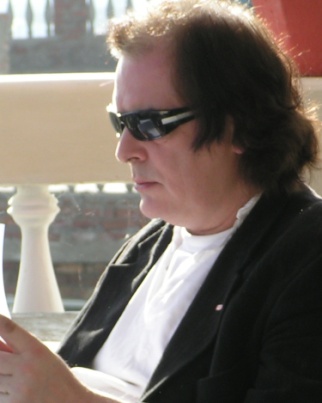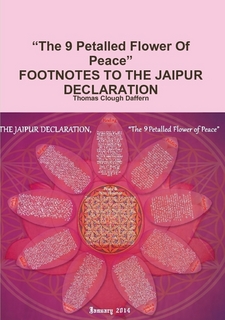We vow to produce and consume responsible media that shares the good news of the human story as well as the bad news; [1] we vow not to produce or consume media that discourages, disheartens, misinforms or de-energises people,[2] but to seek out news that inspires, enthuses and informs people, giving them hope in the possibility of a better world;[3] we vow to abstain from disseminating media stories based on lies, falsity, half-truths, we vow to tell stories from all sides;[4] we vow to report peace as much as war, good news of peace events and breakthroughs as much as wars and terrorism;[5] we recognize the power of the media to co-create reality, to use this power responsibly, we vow to develop a peace media that can encourage the transformation of the world into a place of peace and nonviolence.[6] We vow to abstain from the production or consumption of violent films, computer games and "entertainment" which give the message that violence and war are natural and normal and "good" and instead vow to help the film and media industry generate positive films and computer games that promote peaceful, creative and non-violent human relations.[7]
This is important yes there are many terrible tragedies going on all around us on planet earth, and yes we need the media to cover them, but there are also incredible stories of human kindness, imagination, goodness, ethical behaviour, generosity, and these hardly ever get a mention, except as "afterthoughts". The Jaipur Declaration is calling for some balance here.
The current penchant for "bad news" is not all to be blamed on the media professionals it is also down to each one of us to shift our attention to the good news as much as the bad. There are papers and radio shows and journalists who do try to focus on positive news stories, so we should also pay attention to them.
The responsibility of journalists has always been to seek truth and not to be discouraged; a family friend of my parents (Dr Herb Steinhouse) worked for the Canadian media attached to the Canadian army in World war two and was then working for UNESCO in Paris soon after UNESCO was set up; one day a complete stranger came to visit, calling himself Oskar Schindler, and asked for Herb's help to promote his story in the world's press, in which he had shown kindness to Jews who would otherwise have been gassed at Auschwitz. But although Herb tried to help him, not a single newspaper or radio station would carry the story it was too much like "good news" and they only wanted stories of doom and gloom. Only years later, when Steven Spielberg made his famous movie, Schindler's List, did the press finally discover Herb Steinhouse in Montreal, and his trunk full of Schindler's documents, see Fensch, Thomas Oskar Schindler and his list: the man, the book, the film, the holocaust and its survivors (with an introduction by Herbert Steinhouse, Paul Eriksson Pubs, Vermont, 1995)
Again the critical importance of truth is outlined; there is far too much spin in the media, so you never know which paper or media outlet to trust each seems to tell the news from its own perspective only; real truth, as Jainism and all deep philosophical traditions have always said, can only be communicated by telling events "from all sides". This often means telling things from a transpersonal perspective, looking at the wider implications and causal connections underlying events. Too much news however consists of sound-bytes delivered in simplistic black and white rhetoric oversimplifications. The recent trouble in Crimea and Ukraine is a case in point; Russian media insist Putin is right in his actions, NATO and Western media outlets says Russia is totally wrong. This over-simplistic polarisation is what underlay the false logic of the dark days of the Cold War in which two absolutely true systems battled it out for control of the planet. We are now, in case the media forget, in a multi-polar world in which plural values and visions, all of which are partly true, contest for airtime. Ultimately, perhaps, only enlightenment is ultimately true. See Daffern, T.C Enlightenments: Towards a critical epistemology of enlightenment in different spiritual teachings (IIPSGP Publications, 2009)
This is incredibly important far too often, peace events are not reported, or under reported, while the media can always be relied on to cover every outbreak of violence; why is this? Partly it is because peace is less photogenic than violence; it is easy to film or report conflagrationary events, but much harder to report on the everyday triumphs and delights of life, the small victories and achievements a child taking its first steps, an engagement party, a wedding, a superb musical concert, the discovery of some ancient family heirloom, the sense of awe that a beautiful view from the mountains can give, a message from a departed loved one from a medium that confirms the existence of life after death such things are not "newsworthy" yet they are life itself. Peace conferences, marches, and happenings however can be reported, and every media outlet should have a section that regularly reports them. Where are the peace groups campaigning for peace and reconciliation in Kashmir, or in Syria, or in Crimea, or in Iraq and Afghanistan why have they not been much reported?
In a quantum world we here even physicists now saying that our perceptions help shape existence; Kant earlier made the same point, that the mind projects certain a priori ordering principles onto the way we view reality; Buddhists said much the same aeons ago how we focus our consciousness, what quality of consciousness we bring to bear on our experience, helps shape and form that experience; the same is a grounding principle of the new age, or new thought traditions off 19th, 20th and 21st century thinking, going back to Emerson's essays, Thomas Troward, Ernest Holmes, Marianne Williamson and innumerable modern day sages of all spiritual persuasions, whose work has recently been popularised in films such as The Secret, The Moses Code and What the Bleep Do We Know. The term "new age" is misleading since these ideas are as old as the Upanishads, and the important causal role that consciousness plays in shaping our experience of reality, has been affirmed by all the perennial philosophical teachings of humanity age after age. Given this overwhelming evidence from the wisdom traditions, we recognise that the media needs to get on the team, and realise that it has an incredible responsibility to help shape our collective reality towards a positive outcome; reporters are not passive witnesses only, but the way they report what they see, helps produce what is seen. So we are asking that the media take this responsibility seriously and focus on seeing peace, finding peace, reporting peace and generating peace. This is however not only about focusing on the lives of modern day peace heroes like Mandela, Gandhi, Aung Ssu Chi, but also the work of innumerable peace and non-violence groups and activists around the world, such as those of us who came to Jaipur and issued this declaration. Fortunately, one of the facilitators of the conference was the editor of the Rajasthan Patrika, a major newspaper in India, Dr Gulab Kothari, who is fully aware of the importance of this responsibility that the media bears for helping to encourage wisdom and enlightenment. It is for this reason that peace groups should be encourage to use social media for their networking and dissemination, and why my own organisation, the International Institute of Peace Studies and Global Philosophy uses facebook and YouTube for example, since it enables us to get "good news" out there. We also have a media department which does filming of events etc. As well as being a senior newspaper editor, Dr Gulab Kothari is also a well published scholar of philosophy and added many valuable insights to our deliberations, see Kothari, Gulab Manas: Patterns of the Human Mind (Rajasthan Patrika, 2004) p. 208 where he says that "Wisdom always adopts a holistic approach. It does not notice differences or specialities. It goes beyond the principle of unity, it contemplates collectivity. Intellect acts at the gross level and wisdom acts at the subtle level. The immutable forms the basis for the mutable but ultimately the mutable becomes immutable. Intellect emerges out of wisdom and finally becomes one with it. These are not separate entities. The difference is that of form. You can move from one to the other through practice. When intellect is transformed into wisdom, the ego disappears...Everything wants to revert to the source from which it has emerged" In the same way it could be said that whereas the visually manifested form of the 9 petalled Jaipur Declaration is a product of intellect, it has a subtle and spiritual inner form, which is a product of wisdom, and which is invisible to eh eye which sees form, and only visible to the spiritual eye.
The responsibility of the film industry for promoting images of war and violence are much discussed by scholars and critics, who have suggested the idea of a "peace journalism" to replace that of war journalism. One of the greatest media empires of modern times, owned by Rupert Murdoch, was in fact down to his father, Keith Murdoch (1885-1952) having smuggled out news reports of the horrors of the Gallipoli Campaign in the Dardanelles in World War One, in which many Australian soldiers died needlessly. After the war he went back to Australia and launched the beginning of the Murdoch media empire which his son later inherited and which developed into one of the most powerful media empires in history. In fact, it was founded on what could be called "peace journalism". Wouldn't it be wonderful if the Murdoch Empire could even now launch a "Peace Times" to cover peace events worldwide? The responsibility of the new media and the computer games industry area is so important instead of manufacturing endless war games, or violent games, quest type games with more metaphysical themes and the idea of the inner hero who conquers himself instead of killing outer enemies can be incorporated into such games in the future. Mahavira and Buddha, and Christ, did not achieve their lasting impact on history by becoming warriors, but by achieving self-mastery. It is this idea that the computer games industry can and should be enthusing young minds with, by finding ways to make the challenge of enlightenment exciting enough to appeal to the masses.
 Dr. Thomas Daffern
Dr. Thomas Daffern
